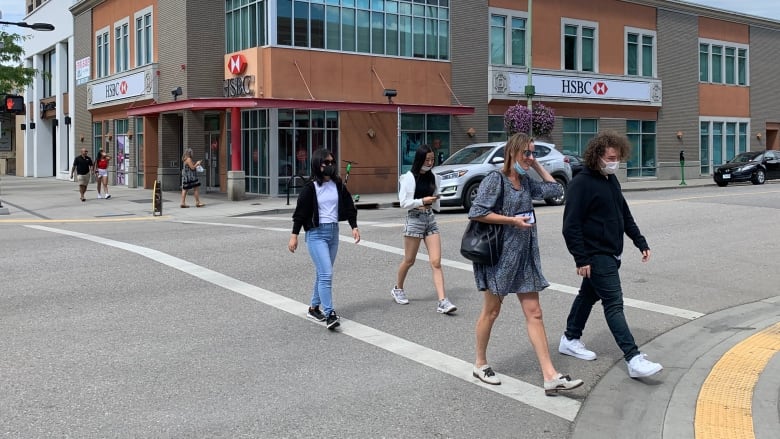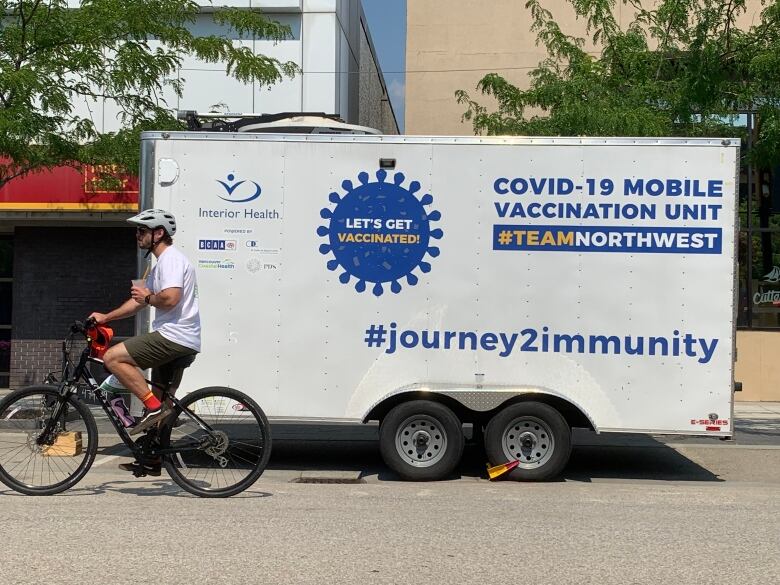Mask mandates and gathering restrictions return to B.C.'s Interior as COVID-19 numbers spike
Health officials say the next phase of reopening is likely on hold for the rest of the province

Restrictions introduced in the Central Okanagan earlier this summer have been expanded to the rest of B.C.'s Interior in response to rising cases of COVID-19 throughoutthe region.
Effective Aug. 21, masks will be mandatory in indoor spaces everywherein theregionfor everyoneaged 12 and over.
High-intensity indoor group exercise will not be allowed, but low-intensity indoor group exercise is permitted to a maximum 10 people per class.Outdoor group fitness is limited to50 people per class.
As of Aug. 23 at 8 a.m., indoor personal gatherings will be limited to one other household, or five guests, and organizedindooreventswill have a 50 person limitand must have a COVID-19 safety plan in place. A safety plan is also required for organized outdoor events, which will be capped at 100 people.
According to Interior Health,these restrictions will be in effectuntil the end of September and the region seeslower case countsand higher vaccination rates.
Stricter public health restrictions were implemented for the Central Okanagan earlier this summer to try to reduce transmission in the area. Further steps were introduced in August. All previous restrictions remain in place.
Provincial Health Officer Dr. Bonnie Henry recommends travellers avoid B.C.'s Interior, regardless of their vaccination status, due to ongoing transmission.
"We understand this news will be disheartening for many in this area, who are not only living with the challenges of the pandemic, but also with the challenges of wildfires and heat and smoke," Henry said.
Lower vaccination rates in the Interior
Henry said transmission is primarily happening in areas with lower vaccination rates, particularly in people who have not received a first dose of COVID-19 vaccine.
About 83 per cent of eligible people 12 and older in B.C. have received their first doseand 74per cent have received their second dose.
In the Interior Health region, roughly 77 per cent of eligible people have received a first dose, and 68 per cent have had two doses.
In Nelson, where transmission is high andhealth resources are stretched thin, a mere 72 per cent of residents have received a first dose. In nearby Creston, that number is even lower at65 per cent.
On Friday, the Ministry of Health announced 663 new cases of COVID-19 across the province, more than 40 per cent of which are in the Interior Health region.
Dr. Rob Parker, acting chief medical health officer for the Interior Health Authority, said the vast majority of new cases of COVID-19 across the regionare inunvaccinated people aged 20 to 59, and it's putting pressure on hospitals.
"People can choose not to be vaccinated," said Health Minister Adrian Dix. "But there will be significant things you will not beable to do if you're not vaccinated."
Nelson Mayor John Dooley said low vaccination rates in his area are "unacceptable" and selfish."
"It's the unvaccinated that are getting COVID right now, and they're tying up our hospitals," he said.
"If we had a major road accident in the Nelson-Trail-Castlegar area right now ... we would not be able to help people. We would have to airlift them to Kelowna, Vancouver or Calgary."
The only solution, he said, is to get people vaccinated.

British Columbians aged 12 and over who have not yet been immunized can register in three ways:
- Online through theGet Vaccinated portal.
- By calling 1-833-838-2323. Translators are available in 140 languages.
- In person at anyService B.C. location.
People can also be immunized atwalk-in clinics throughout the province.
Next phase of reopening likely on hold
Step 4 of B.C.'s restart plan was initially scheduled for Sept. 7, at the earliest. Henry, however, isn't sure B.C. is ready to move on to that next step.
"It's very likely we won't be seeing a move to any more loosening of restrictions in the near term," she said.
Henry expects more information to be made available Monday.
"It's a very evolving situation. As you know, over the last couple of weeks things have changed quite dramatically," she said.
Stricter health measures needed: report
A new report from an independent COVID-19 modelling groupsays without strict health measures, the province could see up to 12,000 new cases per day.
As children head back to school this fall, theB.C. COVID-19 Modelling Group expects the delta variant to make its way through children and youth if health measures aren't in place. Children under the age of 12 are not yet eligible for the COVID-19 vaccine.
The group, which includes experts from the University of B.C., Simon Fraser University and the University of Victoria, also said if cases do climb that high, B.C.'s hospitals will face significantbed shortages.
Dix saidmore information about B.C.'s back-to-school plan will be released next week.
With files from Christina Jung, Tom Popyk the Canadian Press












_(720p).jpg)


 OFFICIAL HD MUSIC VIDEO.jpg)
.jpg)



























































































